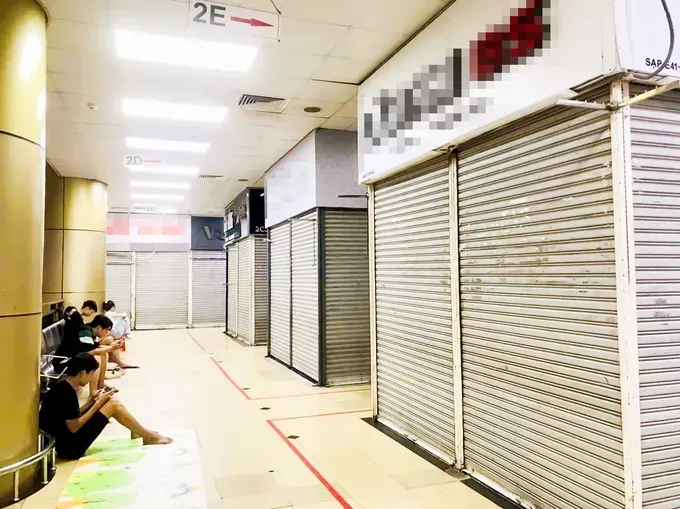
In the afternoon of June 5, at An Dong Market in District 5, an informational session was held to explain the laws and penalties concerning the trade of goods with unclear origins, while also briefing vendors on the new e-invoice regulations.
Adjacent to the session, a few stalls selling confectionery and coffee remained open, catering to international tourists. This was a rare bright spot amidst the market’s otherwise sluggish business floors, where numerous stalls offering fashion and handicrafts remained closed.
“Our merchandise is sourced from small, independent suppliers, so we don’t have input invoices”, explained Mrs. T., a trader at An Dong Market. “Fearing penalties, I’ve closed my stall and packed up my merchandise to take home. Business has been slow since the Covid-19 pandemic, and a lot of traders have already left the market. We hope the Government can support us by allowing us to pay a presumptive tax on the inventory we currently have without input invoices.”
A similarly bleak picture was found in other markets like Binh Tay in District 6 and Tan Binh in Tan Binh District, where many stalls were shuttered. A vendor of 50 years explained that while slow business had already forced closures, the new e-invoice mandate has intensified their anxiety. She shared that most traders are older and not tech-savvy, leaving them unsure how to implement the new system correctly even after attending training sessions from the tax office.
Echoing these concerns, Mr. N., a trader at Tan Binh Market, stressed the need for more hands-on training sessions. He believes more detailed guidance on declaring expenses and the procedures for obtaining input invoices is crucial for vendors to gradually and effectively comply.
Beyond the traditional market traders, many other small business owners are also dodging the new requirement by insisting on cash payments over bank transfers.
Citing her advanced age and a fear of scams, 74-year-old N.T., owner of a steamed rolled rice stuffed pancake shop in the Bac Hai residential area (District 10, HCMC), accepts cash only. Likewise, a seafood vendor on Duong Thi Muoi Street (District 12) only takes cash, even for orders ranging from VND200,000 – 500,000 (US$8 – 20).
Deputy Head Nguyen Tien Dung of Region II Tax Department acknowledged reports of businesses refusing cashless payments or even inflating prices for customers who choose to pay via bank transfer. However, he characterized these as isolated incidents involving a small number of businesses. He suggested the behavior likely stems from a lack of complete information about the government’s policy or apprehension regarding tax declaration obligations.
According to the Deputy Head, while there are no specific penalties yet for refusing non-cash payments, such actions contradict the Party and Government’s overarching goal of promoting a cashless society, building a digital economy, and enhancing transactional transparency.
“I must emphasize that regardless of the transaction method – be it cash or bank transfer – business households are required to issue an invoice and fully declare and pay their taxes. The tax authority is now equipped with modern tools for monitoring, supervision, and post-auditing”, stated Deputy Head Nguyen Tien Dung.
He explained that the e-invoice system allows them to cross-reference input and output data, which can reveal anomalies such as sales revenue that is disproportionately low compared to the value of input invoices or expenses that exceed the presumptive tax threshold.
If tax evasion is discovered, violators may face administrative fines or even criminal prosecution, depending on the severity of the offense. The tax sector thus urges business households to enhance their legal compliance and fulfill their tax obligations, contributing to a fair, transparent, and sustainable business environment.

Meanwhile, the Tax Department of Region I issued an open letter to businesses in Hanoi and Hoa Binh Province. The letter clarifies that under current law, revenue for calculating VAT is determined regardless of whether payment has been received. Therefore, actions like displaying “cash only” signs or using ambiguous transfer descriptions such as “loan repayment”, “coffee money”, or “ship fee” to obscure revenue can be considered deliberate concealment.
Tax authorities affirm their readiness to support and encourage businesses to transition into formal enterprises, which would allow them to benefit from preferential investment and tax policies. For taxpayers who deliberately conceal revenue or file dishonest and incomplete tax declarations, authorities will impose back taxes, assess tax liabilities, and issue penalties for false declarations and tax evasion, with the possibility of criminal charges.
According to Deputy Head Mai Son of the General Department of Taxation (Ministry of Finance), authorities are aware of online sellers using others’ bank accounts or vague transfer details to evade taxes. He affirmed that officials will investigate by cross-referencing data from banks, the Public Security Ministry, the Industry and Trade Ministry, e-commerce platforms, and delivery companies, including monitoring cash-on-delivery payments.
The new regulations aim to increase transparency, not tax rates. Consequently, anyone caught dodging taxes will face back taxes, fines, and possibly criminal charges. To ensure a smooth transition, tax officials will personally visit every business household throughout June to provide direct assistance with the new system.
Implementation Challenges and Concerns
A representative from MISA JSC., a leading provider of e-invoice solutions, mentioned that many business households are worried about the tax declaration implications of the new system, especially given their limited understanding of how to manage input and output invoices.
Some also fear that issuing invoices is complicated and requires a significant investment in equipment. In reality, a smartphone with an internet connection is all that is needed. The process is straightforward, allowing vendors to issue an invoice at the point of sale without losing much time.
According to the provider, registrations for their cash-register-based e-invoice service tripled this past May compared to previous months.
























